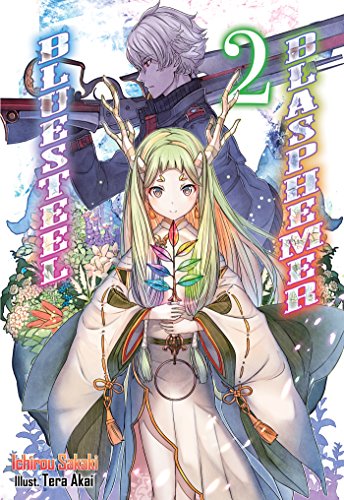By Ichirou Sakaki and Tera Akai. Released in Japan by Hobby Japan. Released in North America digitally by J-Novel Club. Translated by Kevin Steinbach.
In general, I tend to divide up books to review on this site into four categories: Great, Adequate/Good, Adequate/Bad, and Bad. The first and the last are obviously the easiest to review, as there are any number of things that you can say about them to show why you think they’re worth reading (or, in the case of the bad books, not worth reading). Adequate/Bad is tougher, but at least you can usually get away with a laundry list of things that the title is doing wrong. But oh dear, those books which are good but that’s about it. You really have to work at the review, because “good but that’s about it” makes the reader not want to read a book. But they *are* good, and very readable. It’s just there’s really nothing that stands out and makes you go “wow, that made buying this book worth my time’. Such a series is Bluesteel Blasphemer, which is adequate. HIGHLY adequate.
This second volume picks up (after a short setup prologue) right where we left off. Yukinari is settling in uncomfortably as the new erdgod of Friedland, and trying to figure out how to make the village prosper, less by sacrifices and more by irrigation and trade. He’s accompanied by Dasa, who fulfills both the Rei Ayanami clone and Clingy Jealous Girl types in one; Berta, whose love/worship of Yukinari continues to be vaguely disturbing – it makes sense for her character given how she was raised, but I’d really like her to get a hobby or two; and Fiona, the de facto mayor of the village, who sometimes acts as a tease but more often fills the straight man role. We also add Ulrike, who is the main familiar of the erdgod the next village over, a giant forest/tree who uses humans whose lifespan is at an end to become its familiars (Ulrike is seen in the prologue, a cute young kid who dies by getting impaled on a tree. Fortunately, she was impaled by the right tree). Together, they fight against a cadre of grumpy priests whose job is suddenly gone, and some grumpy soldiers who are still trying to be zealots.
If I were to pinpoint things I didn’t care for with this book, it would be the same as the last – the harem stuff feels false and tacked on, and I wish it would go away. Other than that, this is a very smooth, easy to read book. I enjoyed the motivation of the other erdgod, and how a village that doesn’t have much beyond LOTS OF WOOD might turn to it as an alternative to more modern-day thinking like medicine. I liked the examination of what happens to the priests after Yukinari takes over, particularly in regards to the orphanage that suddenly doesn’t have villagers paying to feed its orphans. I liked the vaguely evil foreshadowing going on between the evil old priest and his stacked alchemist which will clearly become the climax to the final book. And the slingshot was hilarious.
So this is a good, solid book that fans of the light novel genre will enjoy, particularly if they like Kamen Rider-style books. But if you’re thinking “I need to cut back on light novels, what would be good?”, this series also comes to mind immediately. I’m happy it’s not 20+ volumes, I can tell you that.

